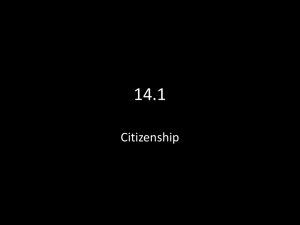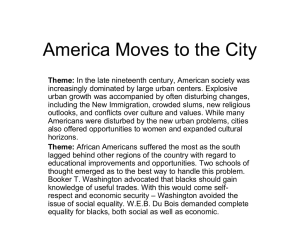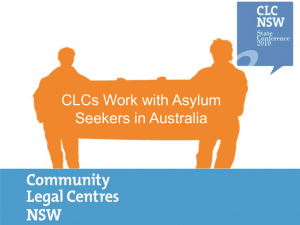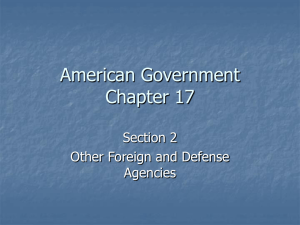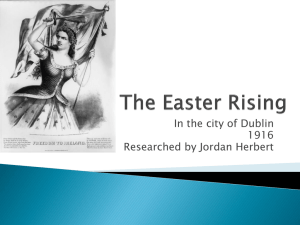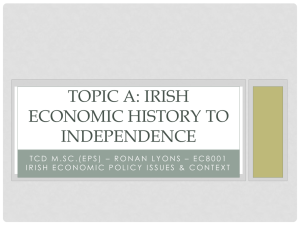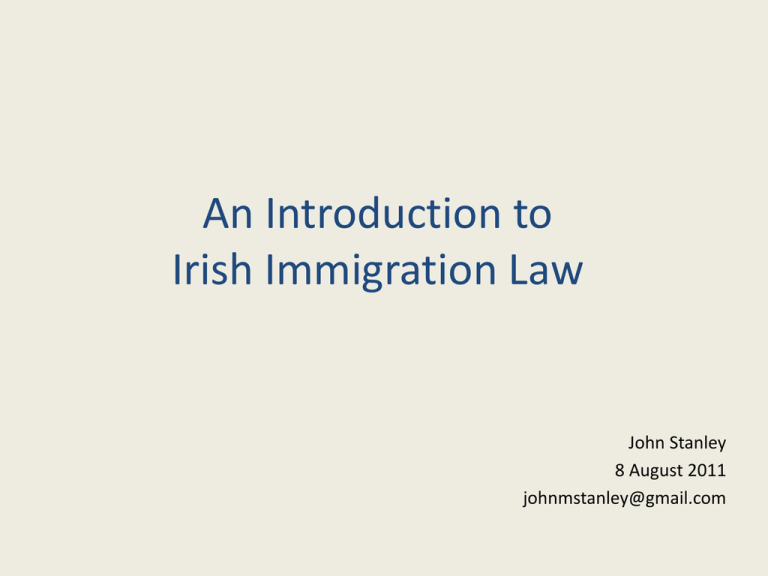
An Introduction to
Irish Immigration Law
John Stanley
8 August 2011
johnmstanley@gmail.com
Section 1.
Introductory Issues
1
Sources of Irish Immigration Law
(A) Irish
The Constitution
Primary Legislation
Statutory Instruments
Policy
Case Law
(B) EU
The Treaties
N.B. The Charter (e.g., Arts 4; 15; 18; 19; 24)
EU Legislation
Policy (e.g., the 5 year programmes)
CJEU Case Law
(C) International
ICCPR
ICESC
CRC
CAT
CRS
MWC
ECHR
Social Charter
Etc.
2. A Brief History of Irish Immigration Law (1/2)
Aliens Act 1935, and its Orders. Until the late 1990s, the dominant legislation.
1997: The Treaty of Amsterdam /Article 1 of Protocol (No 21)
1999: The Tampere European Council 1999 (1999 – 2004 Programme)
Laurentiu v Minister for Justice, Equality and Law Reform & Ors [2000] 1 ILRM;
Leontjava and Chang v Director of Public Prosecutions [2005] 1 ILRM.
1999: The Immigration Act 1999.
2000: The Refugee Act 1996 (Fully operative in 2000).
In the 2000s EU developments resulted in a large body of EU legislation on free movement and asylum requiring
domestic transposition (e.g., the ‘Citizenship Directive’; and the ‘Qualification Directive).
Ireland opts out of much new EU immigration legislation (e.g., the Reception Directive’, the ‘Family Reunification
Directive’; the ‘Long Term Residents Directive’)
Ireland gives domestic effect to international treaties to which it signed up also required domestic application
(e.g., the European Convention on Human Rights; UNCAT).
2. A Brief History of Irish Immigration Law (2/2)
2004: Hague Programme (2005-2009). Emphasised security, returning irregular migrants
2004 Constitutional referendum/IBC 05 Scheme
Immigration, Residence & Protection Bill 2007
Bode (2007) and Oguekwe (2008) Supreme Court decisions
2008 ECJ Metock Decision
Immigration, Residence & Protection Bill 2008
Ireland continues to opt out of EU legislation (e.g., ‘the Returns Directive’)
2009: Stockholm Programme 2009 (2010-2014)/Treaty of Lisbon 2009
Immigration, Residence & Protection Bill 2010
Constructive Deportations of Irish children continue – Alli High Court case (2010)
CJEU Zambrano and McCarthy decisions (2011)
Immigration, Residence & Protection Bill Redux
Agencies & Bodies in the Irish Immigration System
Garda National Immigration Bureau (GNIB)
Immigration Officers
Registration Officers
Minister for Justice and Equality
Asylum Policy
Department of Justice
Visa Appeals Officers
Repatriation Unit
Long Term Residence Unit
EU Treaty Rights Unit
Citizenship Section
Irish Nationality and Immigration Service
Refugee Integration Agency
Department of Foreign Affairs
Embassies/Consulates
Refugee Applications Commissioner
Authorised Officers of the Refugee Applications Commissioner
Presenting Officers
Refugee Appeals Tribunal
Legal Aid Board
Refugee Legal Service
United Nations High Commission for Refugees
3. An Outline of Migrant Rights (1/3)
Immigration Law inextricably linked to Fundamental Rights
•Asylum & the Right to seek Asylum (Art 18 of the Charter)
•Protection Against Refoulement (Art 33 of the Refugee Convention
•Protection Against Human Trafficking (Art 4 ECHR)
•The Right to a Nationality (Art 15 UDHR)
•Protection Against Statelessness
European Convention on Human Rights Provisions
Art 1: The rights are secured to everyone in the jurisdiction.
Art 3: No one shall be subjected to torture or to inhuman or degrading treatment (c.f., Art 4 Charter)
Art 4: No one shall be held in slavery or servitude. (c.f., Art 5 Charter)
No one shall be required to perform forced or compulsory labour.
Art 5: Everyone has the right to liberty and security of person. (c.f., Art 6 Charter)
Art 6: Right to a fair hearing (Art 47 Charter)
Art 8: 1. Everyone has the right to respect for his private and family life, his home and his correspondence.
2. There shall be no interference by a public authority with the exercise of this right except such as is
in
accordance with the law and is necessary in a democratic society in the interests of national security,
public safety or the economic well-being of the country, for the prevention of disorder or crime, for
the protection of health or morals, or for the protection of the rights and freedoms of others.((Art 7)
Art 13: Right to an Effective Remedy (Art 47 Charter)
I
3. An Outline of Migrant Rights (2/3)
The questions to ask in an Article 8 case:
1.
Does Private life exist?
Maslov v Austria [2008] ECHR 546
‘The totality of social ties between settled migrants and the community in which they are living
constitutes part of the concept of ‘private life’…
DM (Zambia) EWCA Civ 474, Court of Appeal case
To remove an AIDS sufferer ‘from free care and treatment in one of the best health services in the world’
was an invasion of her private life.
2
Does Family life exist?
Lebbink v Netherlands para 36:
The existence or non existence of family life is question of fact depending on the real existence in practice
of close personal ties (a child and adoptive parents in that case)
3
Has there been an interference with the right to respect?
Is the interference justified?
Is it in accordance with law?
Is it in pursuit of a legitimate aim?
Is it necessary in a democratic society?
Is it proportionate to the aim pursued
NB, it is the interference, not the aim that must be proportionate.
I
3. An Outline of Migrant Rights (3/3)
Case Comparison
ZH (Tanzania) v SSHD [2011] UKSC 4
Re a challenge to the deportation of a the mother of a British citizen. Relevant principles:
•That in all decisions concerning children, their best interests must be paramount, and a primary consideration; (paras. 21; 25)
•That the important thing in such cases is to consider those best interests first; (para 26)
•That any decision taken without due regard to safeguarding and promoting the welfare of any children involved will not be in accordance with
law; (para 24)
Baroness Hale also cited (at para. 30) with approval the following list of matters which the Court in Wan regarded as important:
“(a) the fact that the children, as citizens of Australia, would be deprived of the country of their own and their mother’s citizenship, ‘and of its
protection and support, socially, culturally and medically, and in many other ways evoked by, but not confined to, the broad concept of
lifestyle’…;
(b) the resultant social and linguistic disruption of their childhood as well as the loss of their homeland;
(c) the loss of educational opportunities available to the children in Australia; and
(d) their resultant isolation from the normal contacts of children with their mother and their mother’s family.”
Alli v Minister for Justice, Equality and Law Reform, High Court, 26 May 2005:
“The real differences between the rights of citizens and those of foreign nationals lie perhaps in lifelong rights to hold an Irish passport, to enter
and leave the State at will; to apply for employment and to vote in constitutional referendums. A citizen applicant to university and third level
courses will not normally face discrimination in entry eligibility or the payment of fees nor will that citizen be affected by entry into those
courses operating restricted entry to foreign nationals. A citizen child who lives abroad can return to avail of his/her privileges in further
education, in unimpeded entry into the other EU States, and in access to that large labour market. The removal of the citizen child’s parents and
the consequent following of that child do not strip the child of citizenship rights and privileges as those rights can be enjoyed fully when the
child is of age if he/she seeks to return to the birth country. However, the birthright of an Irish citizen child does not extend to an unrestricted
right to reside here with his/her foreign national family”
I
Section 2:
Immigration, Free Movement,
and Citizenship Law
4. Immigration Law
Visas
Pre Entry Clearance
Section 17 Immigration Act 2004
Visas Orders
C Visa = Short Stay
D Visa = Long Stay
Typical Documentation for a visa application:
Completed visa application signed by the applicant
Consent of both parents for children travelling alone
Consent of one parent of sole custody where the child is travelling with the other parent
Valid passport
Evidence of financial self-sufficiency for duration of stay
Details of other family members in Ireland, or other member states
Details of any previous Irish visa applications
Details of any visa refusals for any other country
4. Immigration Law
Permission to Be in the State
4.—(1) Subject to the provisions of this Act, an immigration officer may, on behalf of the Minister, give to a non-national a document,
or place on his or her passport or other equivalent document an inscription, authorising the non-national to land or be in the State
(referred to in this Act as ‘‘a permission’’). (Section 4 Immigration Act 2004)
See also section 5(1) & (2) of the Immigration Act 2004
5.—(1) No non-national may be in the State other than in accordance with the terms of any permission given to him or her before
the passing of this Act, or a permission given under this Act after such passing, by or on behalf of the Minister.
(2) A non-national who is in the State in contravention of subsection (1) is for all purposes unlawfully present in the State.
Saleem v The Minister for Justice, Equality and Law Reform, Cooke J, 2 June 2011
If one leaves aside the special arrangements applicable to migrant workers who are nationals of a Member State of the European
Union or of a state in the European Economic Area, the arrangements governing an entitlement to enter or land in the State and to
remain within the jurisdiction thereafter, derive in effect from ss. 4 and 5 of the Immigration Act 2004. Section 5 of that Act provides
that no non-national may be in the State other than in accordance with the terms of ta permission given under the Act by or on
behalf of the Minister, or given before the passing of that Act. Section 4 provides that an Immigration Officer may on behalf of the
Minister give a non-national, either by means of a document or by placing a stamp on his passport, “an authorization to land or be in
the State”.
An Immigration Officer can refuse to give permission to land or be in the State if satisfied that any of the situations set out in section
4(3)(a) to (k) apply.
There is no statutory appeal against a refusal.
4. Immigration Law
Residence Stamps
Stamp 1:
Non EEA nationals with an employment permit or business permission (employment permit holders; Green Card holders;
business permission; working holiday authorizations; non EEA doctors)
Stamp 1A:
Non EEA nationals authorized for full time training with a named body until a specified date (trainee accountants).
Stamp 2:
during
Non EEA national students who are permitted to work up to 20 hours per week during term, and up to 40 hours per week
holidays.
Stamp 2A:
Non EEA national students who are not permitted to work.
Stamp 3:
Non EEA nationals who are not permitted to work (visitors; spouses and dependents of people with residency/citizenship).
Stamp 4:
People who are permitted to work without needing an employment permit or business permission (Non EU EEA nationals;
Spouses and dependants of Irish and EEA nationals; People who have permission to remain on the basis of parentage of an Irish
child; Convention and Programme refugees; People granted leave to remain; Non- EEA nationals on intra-company transfer;
Temporary registered doctors; Non-EEA nationals who have working visas or work authorizations).
Stamp 4 (EU FAM): Non EEA national family members of EU citizens who have exercised their right to move to and live in Ireland under the
European Communities (Free Movement of Persons) Regulations 2006. People holding this stamp are permitted to work
without needing an employment permit or business permission, and they can apply for a residence card under the 2006
Regulations.
Stamp 5:
remain
Foreign nationals who have lived in Ireland for at least eight years and have been permitted by the Minister for Justice to
in Ireland without condition as to time. They do not need an employment permit or business permission to work.
Stamp 6:
Placed on the foreign passport of an Irish citizen who has dual citizenship, and who wants their entitlement to remain in Ireland
to be endorsed on their foreign passport.
4. Immigration Law
Habitual Residence Condition (1/2)
The Habitual Residence conditions may apply where residents in the State seek to get any of the following benefits:
Blind Pension
Carer's Allowance
Child Benefit
Disability Allowance
Domiciliary Care Allowance
Guardian's Payment (Non Contributory)
Jobseeker's Allowance
One Parent Family Payment
State Pension (Non Contributory)
Supplementary Welfare Allowance (other than once off exceptional and urgent needs payments)
Widow(er)'s Non Contributory Pension
Relevant Factors/Considerations
Section 246(4) provides that a deciding officer, when determining whether a person is habitually resident in the State, shall take into
consideration all the circumstances of the case including, in particular, the following:
The length and continuity of residence in the State or in any other particular country;
The length and purpose of any absence from the State;
The nature and pattern of the person's employment;
The person's main centre of interest, and
The future intentions of the person concerned as they appear from all the circumstances.
4. Immigration Law
Habitual Residence Condition (2/2)
Section 246(6) stipulates those who are to be taken to have a right to reside in the State:
•An Irish citizen
•A person who has a right to enter and reside in the State under EU law
•A refugee/Programme Refugee/Person with Subsidiary Protection
•A member or dependent member of the family of a refugee
•A member or dependent member of the family of a person with subsidiary protection
•A person with permission to remain under section 4 or 5 of the Immigration Act 2004.
Excluded People
Section 246(7) sets out those who shall not be regarded as being habitually resident in the State for the purpose of this Act:
•An applicant for asylum/subsidiary protection
•A person the subject of a proposal to deport
•An unsuccessful asylum seeker
•A unsuccessful applicant for subsidiary protection
•A person against whom a deportation order has been made
People whose duration of habitual residence is limited
Section 246(8) sets out those whose habitual residence applies only from the date of their declaration/permission to remain:
•A refugee/person with Subsidiary Protection
•A member or a dependent member of the family of a refugee
•A member or a dependent member of the family of a person with subsidiary protection
•A person granted permission to remain in the State (‘under and in accordance with the Immigration Act 1999 or the Immigration Act 2004’)
4. Immigration Law
Long Term Residence
Long term residence
Applicable to people legally resident for five years
Valid for five years
Residence without condition as to time
Applicant must have lived legally in the State for eight years
Not available to international students; temporary registered doctors; trainee accountants; intra company transfers.
Exempts holder from needing a work permit
Valid until expiry of the passport
No longer accepted from foreign nationals with a Stamp 4 who already have long term residency
Residence without condition
Through a parent born in the State
Through a grandparent born in the State
Naturalisation/Post Nuptial Citizenship
Applicant who had a previous Without Condition endorsement
Applicant has a parent who was granted citizenship by naturalisation/PNC/parentage/etc before the applicant in question
was born.
Irish citizens with dual nationality may get this stamp on their foreign passport.
There is no legislative or administrative scheme for permanent residence.
4. Immigration Law
Deportation Orders (1/2)
The deportation process is provided by s. 3 of the Immigration Act 1999. S. 3(1) contains the provision giving the Minister power to
order a foreign national to leave, and thereafter remain out of, the State, subject to the prohibition of refoulement in s. 5 of the
Refugee Act, 1996 (as amended):
3.- (1) Subject to the provisions of section 5 (prohibition of refoulement) of the Refugee Act, 1996, and the subsequent provisions of this section, the
Minister may by order (in this Act referred to as “a deportation order”) require any non-national specified in the order to leave the State within such
period as may be specified in the order and to remain thereafter out of the State.
Pursuant to s. 3(2) of the 1999 Act, a deportation order can only be made in respect of:
(a) a person who has served or is serving a term of imprisonment imposed on him or her by a court in the State,
(b) a person whose deportation has been recommended by a court in the State before which such person was indicted for or charged with any crime
or offence,
(c) a person who has been required to leave the State under Regulation 14 of the European Communities (Aliens) Regulations, 1977 (S.I. No. 393 of
1977),
(d) a person to whom Regulation 19 of the European Communities (Right of Residence for Non-Economically Active Persons) Regulations, 1997 (S.I.
No. 57 of 1997) applies,
(e) a person whose application for asylum has been transferred to a convention country for examination pursuant to section 22 of the Refugee Act,
1996,
(f) a person whose application for asylum has been refused by the Minister,
(g) a person to whom leave to land in the State has been refused,
(h) a person who, in the opinion of the Minister, has contravened a restriction or condition imposed on him or her in respect of landing in or entering
into or leave to stay in the State,
(i) a person whose deportation would, in the opinion of the Minister, be conducive to the common good.
While s. 5 of the 2004 Act renders unlawful any non national without a permission to be in the State, deportation orders can be made only in
respect of the categories of person set out at s. 3(2)(a)-(i) of the 1999 Act. Accordingly, the Minister has no power to make deportation orders
in respect of persons unlawfully in the State under s. 5 of the 2004 Act, but who do not come within the categories set out in s. 3(2)(a) to (i).
4. Immigration Law
Deportation Orders (2/2)
Representations Against Deportation
Statutory qualifications to the Minister’s power to make a deportation order.
Non Refoulement (s. 5 Refugee Act 1996)
5.- (1) A person shall not be expelled from the State or returned in any manner whatsoever to the frontiers of territories where, in the
opinion of the Minister, the life or freedom of that person would be threatened on account of his or her race, religion, nationality,
membership of a particular social group or political opinion.
(2) Without prejudice to the generality of subsection (1), a person’s freedom shall be regarded as being threatened if, inter alia, in
the opinion of the Minister, the person is likely to be subject to a serious assault (including a serious assault of a sexual nature).
S. 3(3) and (6) of the Immigration Act, 1999:
3.-(6) In determining whether to make a deportation order in relation to a person, the Minister shall have regard to
(a) the age of the person;
(b) the duration of residence in the State of the person;
(c) the family and domestic circumstances of the person;
(d) the nature of the person's connection with the State, if any;
(e) the employment (including self-employment) record of the person;
(f) the employment (including self-employment) prospects of the person;
(g) the character and conduct of the person both within and (where relevant and ascertainable) outside the State (including any criminal
convictions);
(h) humanitarian considerations;
(i) any representations duly made by or on behalf of the person;
(j) the common good; and
(k) considerations of national security and public policy, so far as they appear or are known to the Minister.
These qualifications constitute the criteria in what is informally referred to as an application for ‘leave to remain’, but which is better
understood as a claim against the making of a deportation order.
4. Immigration Law
Detention
Detention of asylum seekers (S. 9(8) Refugee Act 1996)
Detention pending Transfer under the Dublin Regulation (S. 22 Refugee Act 1996)
Detention of foreign nationals arriving at ports (S 7 Immigration Act 2004)
Detention of people refused leave to land (S. 5 Immigration Act 2003)
Detention of foreign nationals without ID (S. 13 Immigration Act 2004)
Sections 12 of the Immigration Act 2004:
12.—(1) Every non-national present in the State (other than a non-national under the age of 16 years) shall produce on demand—
(a) a valid passport or other equivalent document, issued by or on behalf of an authority recognised by the Government, which
establishes his or her 5 identity and nationality, and
(b) in case he or she is registered or deemed to be registered under this Act, his or her registration certificate.
(2) (a) A non-national who contravenes this section shall be guilty of an offence.
(b) In proceedings brought against a person for an offence under this section, it shall be a defence for the person to prove that, at the
time of the alleged offence, he or she had reasonable cause for not complying with the requirements of this section to which the offence
relates.
(3) In this section ‘on demand’ means on demand made at any time by the Minister, any immigration officer or a member of the Garda
Síochána, for the purposes of establishing that the presence in the State of the non-national concerned is not in contravention of section
5.
Detention pending Deportation (s. 5 Immigration Act 1999)
5.—(1) Where an immigration officer or a member of the Garda Síochána, with reasonable cause, suspects that a person against whom a deportation
order is in force has failed to comply with any provision of the order or with a requirement in a notice under section 3 (3)(b)(ii), he or she may arrest
him or her without warrant and detain him or her in a prescribed place.
•Detention under s. 5 must be for the purpose of effecting a deportation order.
•And it must be evident that the deportation can actually be effected within the eight-week maximum period for detention under the section. (Om v Governor
of Cloverhill Prison, Unreported, Hogan J, 1 August 2011)
5 EU Free Movement & Citizenship (1/5)
EU Citizen Right of Residence up to Three Months
Article 6(1) Directive 2004/38
1. Union citizens shall have the right of residence on the territory of another Member State for a period of up to three months without
any conditions or any formalities other than the requirement to hold a valid identity card or passport.
Right of Residence for more than Three Months
Article 7:
1. All Union citizens shall have the right of residence on the territory of another Member State for a period of longer than three
months if they:
(a) are workers or self-employed persons in the host Member State; or
(b) have sufficient resources for themselves and their family members not to become a burden on the social assistance system of the
host Member State during their period of residence and have comprehensive sickness insurance cover in the host Member State; or
(c) — are enrolled at a private or public establishment, accredited or financed by the host Member State on the basis of its legislation or
administrative practice, for the principal purpose of following a course of study, including vocational training; and
— have comprehensive sickness insurance cover in the host Member State and assure the relevant national authority, by means of a
declaration or by such equivalent means as they may choose, that they have sufficient resources for themselves and their family
members not to become a burden on the social assistance system of the host Member State during their period of residence;
(d) are family members accompanying or joining a Union citizen who satisfies the conditions referred to in points (a), (b) or (c).
Permanent Residence
Article 16(1) Directive 2004/38
Union citizens who have resided legally for a continuous period of five years in the host Member State shall have the right of permanent
residence there. This right shall not be subject to the conditions provided for in Chapter III…
3. Continuity of residence shall not be affected by temporary absences not exceeding a total of six months a year, or by absences of a
longer duration for compulsory military service, or by one absence of a maximum of 12 consecutive months for important reasons such
as pregnancy and childbirth, serious illness, study or vocational training, or a posting in another Member State or a third country.
4. Once acquired, the right of permanent residence shall be lost only through absence from the host Member State for a period
exceeding two consecutive years.
5. EU Free Movement & Citizenship Law (2/5)
Workers’ Rights
Article 7(3) of the Citizenship Directive:
For the purposes of paragraph 1(a), a Union citizen who is no longer a worker or self-employed person shall retain the status
of worker or self-employed person in the following circumstances:
(a) he/she is temporarily unable to work as the result of an illness or accident;
(b) he/she is in duly recorded involuntary unemployment after having been employed for more than one year and has
registered as a job-seeker with the relevant employment office;
(c) he/she is in duly recorded involuntary unemployment after completing a fixed-term employment contract of less than a
year or after having become involuntarily unemployed during the first twelve months and has registered as a job- seeker with
the relevant employment office. In this case, the status of worker shall be retained for no less than six months;
(d) he/she embarks on vocational training. Unless he/she is involuntarily unemployed, the retention of the status of worker
shall require the training to be related to the previous employment.
Article 7 Regulation 1612/68:
1. A worker who is a national of a Member State may not, in the territory of another Member State, be treated differently from national
workers by reason of his nationality in respect of any conditions of employment and work, in particular as regards remuneration,
dismissal, and should he become unemployed, reinstatement or re-employment;
2. He shall enjoy the same social and tax advantages as national workers.
3. He shall also, by virtue of the same right and under the same conditions as national workers, have access to training in vocational
schools and retraining centres.
Any clause of a collective or individual agreement or of any other collective regulation concerning eligibility for employment,
employment, remuneration and other conditions of work or dismissal shall be null and void in so far as it lays down or authorises
discriminatory conditions in respect of workers who are nationals of the other Member States.
I
5. EU Free Movement & Citizenship Law (3/5)
Family Members
Articles 2 & 3 Directive 2004/38:
Union Citizen’s spouse
Registered partner if the State treats such partnerships as equivalent to marriage
Children under 21
Grandchildren under 21
Dependent children or grandchildren over 21
Dependent parents or grandparents
‘Other’ Family Members
Article 3 Directive 2004/38:
(a) any other family members, irrespective of their nationality, not falling under the definition in point 2 of Article 2 who, in the country from
which they have come, are dependants or members of the household of the Union citizen having the primary right of residence, or where serious
health grounds strictly require the personal care of the family member by the Union citizen;
(b) the partner with whom the Union citizen has a durable relationship, duly attested.
Entry to the State
Article 5(2) Directive 2004/38:
2. Family members who are not nationals of a Member State shall only be required to have an entry visa in accordance with Regulation (EC) No
539/2001 or, where appropriate, with national law. For the purposes of this Directive, possession of the valid residence card referred to in Article
10 shall exempt such family members from the visa requirement.
Member States shall grant such persons every facility to obtain the necessary visas. Such visas shall be issued free of charge as soon as possible
and on the basis of an accelerated procedure.
I
5.
5. EU Free Movement & Citizenship Law (4/5)
Family Members’ Rights
Residence up to Three Months
Article 6(2) Directive 2004/38
2. The provisions of paragraph 1 shall also apply to family members in possession of a valid passport who are not nationals of a
Member State, accompanying or joining the Union citizen.
Residence Beyond Three Months
Article 7(2) Directive 2004/38
2. The right of residence provided for in paragraph 1 shall extend to family members who are not nationals of a Member State,
accompanying or joining the Union citizen in the host Member State, provided that such Union citizen satisfies the conditions
referred to in paragraph 1(a), (b) or (c).
Residence without the Union Citizen
Death/Departure of the Union Citizen (Article 12 – EU family members only re departure)
Divorce/Annulment/Termination of Partnership (Article 13)
Baumbast provision
Personal capacity prior to permanence
Permanent Residence
2. Paragraph 1 shall apply also to family members who are not nationals of a Member State and have legally resided with the Union
citizen in the host Member State for a continuous period of five years.
I
5. EU Free Movement & Citizenship Law (5/5)
Removal, Exclusion & Detention
Removal - Regulation 20 of SI 656 of 2006 provides for removal:
20. (1) (a) Subject to paragraph (6), the Minister may by order require a person to whom these Regulations apply to leave the State
within the time specified in the order
Exclusion - Regulation 23 of SI 656 of 2006 provides for exclusion:
23. (1) The Minister may, if he or she considers it necessary in the interest of public security or public policy, by order exclude a person to
whom these Regulations apply from the State.
(2) (a) A person the subject of an exclusion order may apply to the Minister to have the exclusion order revoked.
Detention - Regulation 20(4) of SI 656 of 2006 provides for detention:
(4) (a) A person to whom a notice under paragraph (3)(b)(ii) has been issued may without further notice be arrested and detained under
warrant of an immigration officer or member of the Garda Síochána in any of the places listed in Schedule 10 in the custody of the officer
or member of the Garda Síochána for the time being in charge of that place for the purpose of ensuring his or her departure from the
State in accordance with the removal order concerned.…
Some Key Cases:
Case C-267/83 Diatta v Land Berlin [1985] ECR 567
Case C-413/99 Baumbast v SHHD [2002] 3 CLMR 23
Case C-127/08 Metock v Minister for Justice, Equality and Law Reform
KG (Sri Lanka) v SSHD [2008] EWCA Civ 13
Zhu & Chen v SHHD [2004] Imm Ar 33
Case C-34/09 Zambrano, Unreported, 9 March 2011
Case C-434/09 McCarthy, Unreported, 5 May 2011
6. Irish Citizenship Law (1/5)
Citizenship & Nationality in the Constitutional of Ireland
Article 2 of the Constitution of Ireland
It is the entitlement and birthright of every person born in the island of Ireland, which includes its islands and
seas, to be part of the Irish Nation. That is also the entitlement of all persons otherwise qualified in accordance
with law to be citizens of Ireland. Furthermore, the Irish nation cherishes its special affinity with people of Irish
ancestry living abroad who share its cultural identity and heritage.
Article 9 of the Constitution of Ireland
1. 1° On the coming into operation of this Constitution any person who was a citizen of Saorstát Éireann
immediately before the coming into operation of this Constitution shall become and be a citizen of Ireland.
2° The future acquisition and loss of Irish nationality and citizenship shall be determined in accordance with law.
3° No person may be excluded from Irish nationality and citizenship by reason of the sex of such person.
2. 1° Notwithstanding any other provision of this Constitution, a person born in the island of Ireland, which
includes its islands and seas, who does not have, at the time of the birth of that person, at least one parent who
is an Irish citizen or entitled to be an Irish citizen is not entitled to Irish citizenship or nationality, unless provided
for by law.
2° This section shall not apply to persons born before the date of the enactment of this section.
3. Fidelity to the nation and loyalty to the State are fundamental political duties of all citizens.
6. Irish Citizenship Law (2/5)
S. 29 of the Irish Nationality and Citizenship Act 1956 as amended
An Irish citizen, wherever born, shall be entitled to all the rights and privileges conferred by the terms of any enactment on persons
born in the State.
Citizenship by Birth : Section 6A(1) of the 1956 Act:
A person born in the island of Ireland shall not be entitled to be an Irish citizen unless a parent of that person has, during the period
of 4 years immediately preceding the person’s birth, been resident in the island of Ireland for a period of not less than 3 years or
periods the aggregate of which is not less than 3 years
Citizenship by Descent: Section 7(1) of the 1956 Act:
A person is an Irish citizen from birth if at the time of his or her birth either parent was an Irish citizen or would if alive have been an
Irish citizen.
Citizenship of Children Otherwise Stateless: Section 6(3) of the 1956 Act:
A person born in the island of Ireland is an Irish citizen from birth if he or she is not entitled to citizenship of any other country.
Citizenship of Foundlings: Section 10 of the 1956 Act:
Every deserted newborn child first found in the State shall, unless the contrary is proved, be deemed to have been born in the island
of Ireland to parents at least one of whom is an Irish citizen.
Citizenship of Adopted Children: Section 11(1):
Upon an adoption order being made, under the Adoption Act 1952 (No. 25 of 1952), in a case in which the adopter or, where the
adoption is by a married couple, either spouse is an Irish citizen, the adopted child, if not already an Irish citizen, shall be an Irish
citizen.
I
6. Irish Citizenship Law (3/5)
Citizenship by Naturalisation - Section 14 of the 1956 Act:
Irish citizenship may be conferred on a non-national by means of a certificate of naturalisation granted by the Minister.
Section 15(1) and (2):
(1) Upon receipt of an application for a certificate of naturalisation, the Minister may, in his absolute discretion, grant the
application, if satisfied that the applicant—
(a)(i) is of full age, or
(ii) is a minor born in the State;
(b) is of good character;
(c) has had a period of one year's continuous residence in the State immediately before the date of the application and, during the eight years
immediately preceding that period, has had a total residence in the State amounting to four years;
(d) intends in good faith to continue to reside in the State after naturalisation; and
(e) has made, either before a Justice of the District Court in open court or in such manner as the Minister, for special reasons, allows, a declaration in
the prescribed manner, of fidelity to the nation and loyalty to the State.
(2) The conditions specified in paragraphs (a) to (e) of subsection (1) are referred to in this Act as conditions for naturalisation.
Section 16 – power to dispense with the conditions for naturalistion:
The Minister may, in his absolute discretion, grant an application for a certificate of naturalisation in the following cases, although
the conditions for naturalisation (or any of them) are not complied with:
(a) where the applicant is of Irish descent or Irish associations;
(b) where the applicant is a parent or guardian acting on behalf of a minor of Irish descent or Irish associations;
(c) where the applicant is a naturalised Irish citizen acting on behalf of a minor child of the applicant; …
(f) where the applicant is or has been resident abroad in the public service;
(g) where the applicant is a person who is a refugee…
(2) For the purposes of this section a person is of Irish associations if—
(a) he or she is related by blood, affinity or adoption to a person who is an Irish citizen or entitled to be an Irish citizen, or
(b) he or she was related by blood, affinity or adoption to a person who is deceased and who, at the time of his or her death, was an Irish citizen or
entitled to be an Irish citizen.
Irish Citizenship Law (4/5)
Absolute Discretion
B v Minister for Justice, Equality and Law Reform, Cooke J, 18 June 2009
Section 15 provides that when the Minister is satisfied that an applicant fulfils the naturalisation conditions he may nevertheless
refuse to grant the certificate in his absolute discretion. In such event the court cannot act as a court of appeal from the decision and
while the Minister’s discretion is not an unfettered one, the court cannot interfere so long as it has been exercised by the Minister in
accordance with the powers granted under the section and has been exercised fairly and in accordance with the principles of natural
justice.
Abuissa v Minister for Justice, Equality and Law Reform, Clark J, 1 July 2010 (para 69):
As the grant of naturalisation is neither a right nor a benefit to which any applicant has a legal entitlement, the effect of a refusal
without reasons of an application for naturalisation does not have the consequence or effect of withholding from the applicant a
benefit which would be withheld or granted “to a class of persons of significant size having regard to all the circumstances and of
which the person is a member”. As previously stated, the application here was for the exercise of the Minister’s absolute discretion to
confer a privilege which the applicant accepts is not entitlement even if the conditions for naturalisation are met.
C.F., Hussain v Minister for Justice, Equality and Law Reform, Hogan J, 13 April 2011 (para 18):
Yet if the Minister could act entirely upon his own personal conceptions of what was entailed by good character on the basis that the
Oireachtas had thereby vested him with an “absolute” discretion, the way would be opened for the imposition of private morality
and arbitrary choice in the sphere of public law. In fairness, counsel for the Minister, Ms. Stack, fairly disclaimed any such contention,
although she did argue that the words gave the maximum possible degree of leeway to the Minister in making an assessment of this
kind.
Irish Citizenship Law (5/5)
Citizenship & EU Principles
Case C-369/90 Micheletti v Delegación del Gobierno Cantabria, the ECJ held:
(10) Under international law, it is for each Member State, having due regard to Community law, to lay down the
conditions for the acquisition and loss of nationality.
Case C-192/99 Kaur, the Court of Justice of the European Union, at para 19:
(19) As the Court held in paragraph 10 of Micheletti and Others, cited above, [u]nder international law, it is for
each Member State, having due regard to Community law, to lay down the conditions for the acquisition and loss
of nationality.
Case 200/02 Zhu and Chen, para 37
(37) Nevertheless, under international law, it is for each Member State, having due regard to Community law, to
lay down the conditions for the acquisition and loss of nationality (see, in particular, Case C-369/90 Micheletti
and Others [1992] ECR I-4329, paragraph 10, and Case C-192/99 Kaur [2001] ECR I-1237, paragraph 19).
Case C-135/08 Rottmann (unreported), 2 March 2010, the Court of Justice held
That it was for that Court to rule on questions referred to it by a Member State which concerned the conditions
under which a Union citizen may, because he loses his nationality, lose his status of citizen of the Union, and
thereby be deprived of the rights attaching to that status.
7. Particular Categories of People at Risk (1/2)
Asylum Seekers
Procedure: Refugee Act 1996; SI 518 of 2006
Status: Refugee Status; Programme Refugee Status (Refugee Act 1996)
Rights: Sections 3 & 18 Refugee Act 1996
Subsidiary Protection Applicants
Procedure Deportation Procedure
Status: Subsidiary Protection Status (SI 518 of 2006)
Rights: SI 518 of 2006
People at Risk of Non Refoulement
Procedure : Deportation Process
Status: Leave to remain (source contested)
Rights: Discretionary
7. Particular Categories of People at Risk (2/2)
Victims of Human Trafficking
Procedure: Administrative System (N.B., Article 5(3) Charter)
Status: Identification as Possible Victims
Rights: Temporary
Stateless People
Procedure: None
Status: None
Rights: No statutory rights
Undocumented Migrants
.Procedure: S 3 Immigration Act 1999?; S 4 Immigration Act 2004?
Status: Leave to remain?; Permission to be in the State?
Rights: No statutory rights
Postscript
Proposed Legislative Reform
The Immigration, Residence and Protection Bill 2010
New Legal Provisions on:
Visas
Permission to land/residence
Entry clearance prerequisite
Exclusion
Detention
Asylum
Subsidiary Protection
Non Refoulement
Human Trafficking - Current Administrative Scheme Codified
Leave to remain/Examination of file removed
Judicial Review rules more stringent
Deportation becomes Removal without notice
Unaddressed:
Stateless Persons
Undocumented Migrants

